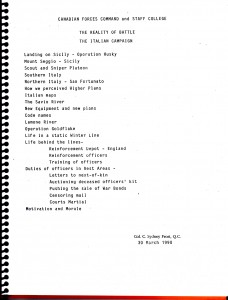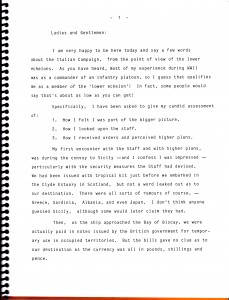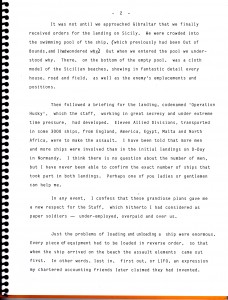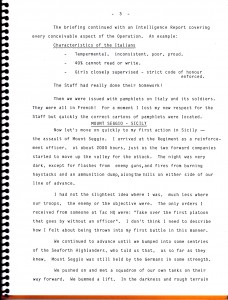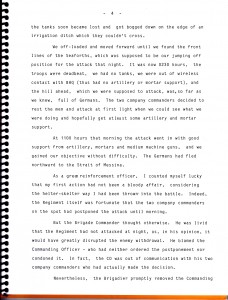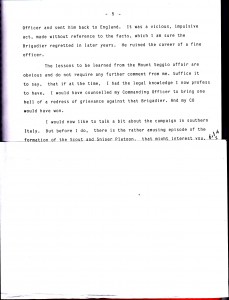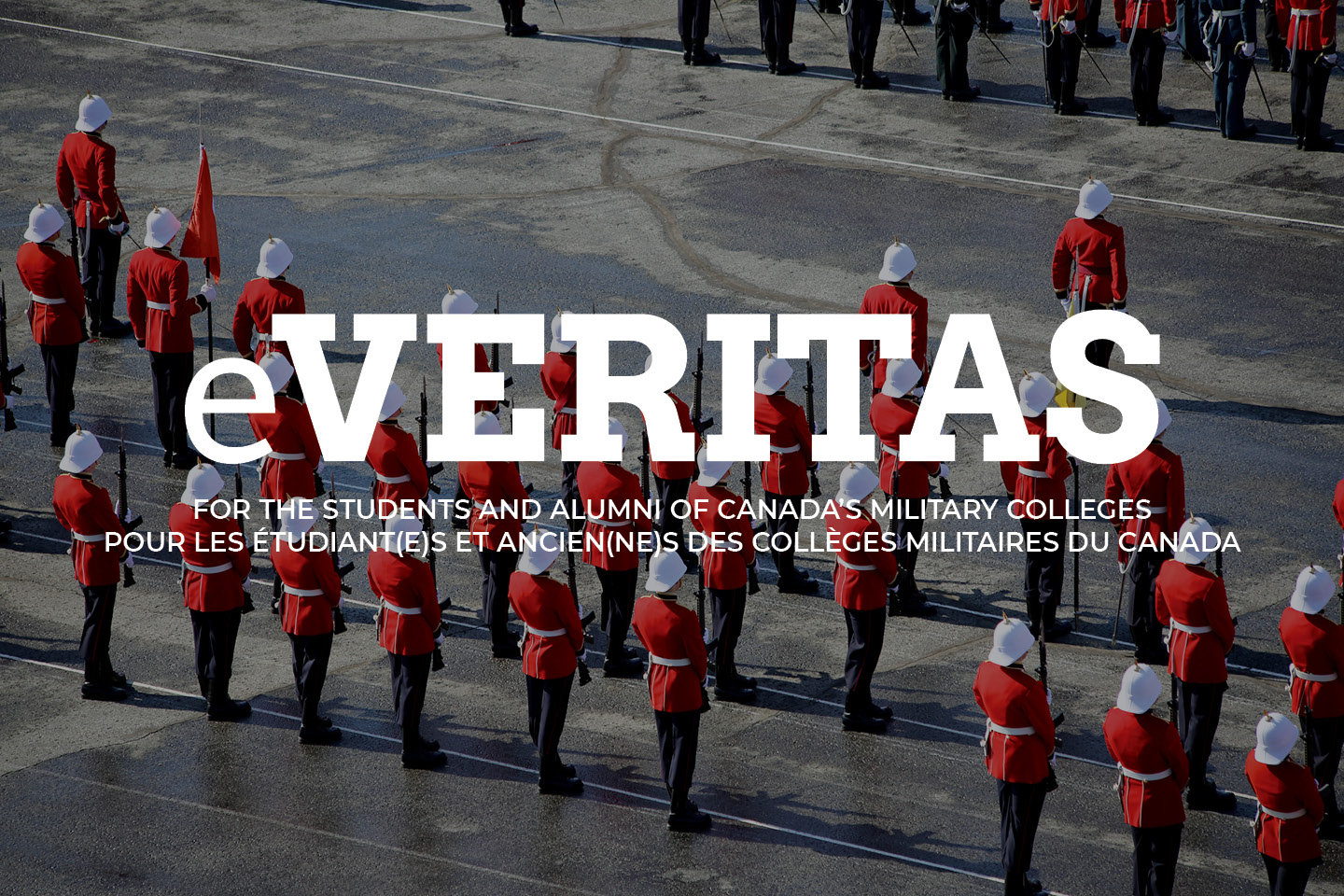
Part I: Memories from the Italian Campaign – Col C Sydney Frost, Q.C. presented at Canadian Forces Command and Staff College – 30 March 1990.
Introduction for C.S. Frost commentary
By 12570 Mike Kennedy
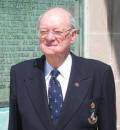 I first became acquainted with 2761 Colonel Syd Frost in the spring of 2005, at the time I was in the process of writing a piece for the print edition of Veritas to commemorate the 60th anniversary of the end of the Second World War. I interviewed Colonel Frost on a couple of occasions at his home in Toronto. Notwithstanding the fact that he was well into his 80’s, his mind was as sharp as a tack, and his memories of the war as vivid as if it had ended yesterday. Suffice it to say that one would be hard pressed to find a more dignified, elegant, and welcoming gentleman than Colonel Frost. Like many of his vintage, he was a true man of honour, and it is accordingly a great privilege to be able to write these opening remarks.
I first became acquainted with 2761 Colonel Syd Frost in the spring of 2005, at the time I was in the process of writing a piece for the print edition of Veritas to commemorate the 60th anniversary of the end of the Second World War. I interviewed Colonel Frost on a couple of occasions at his home in Toronto. Notwithstanding the fact that he was well into his 80’s, his mind was as sharp as a tack, and his memories of the war as vivid as if it had ended yesterday. Suffice it to say that one would be hard pressed to find a more dignified, elegant, and welcoming gentleman than Colonel Frost. Like many of his vintage, he was a true man of honour, and it is accordingly a great privilege to be able to write these opening remarks.
For those who are not familiar with his life story, Charles Sydney Frost Junior was born in June 1922, at a time when the greatest war in history (at least up to that point) had ended only a few short years earlier. His father, Charles Sydney Frost Sr., was a native of Nova Scotia who joined the Bank of Nova Scotia at age 14 in 1908, and who over the next 50 years rose to become the bank’s CEO. Frost Sr. interrupted his banking career for service in the First World War, enlisting as a Private in the Newfoundland Regiment during the first week of September 1914. He finished the war as a Captain, having earned the Military Cross for valour in combat, and being one of the very few from his regiment who were to survive that terrible first day on the Somme.
Frost Jr. grew up on the move, as his family followed his father’s banking career to various locations across Canada. He reported to RMC in 1940 as a recruit in the “Last War Class”, a celebrated group whose members included 2759 Charly Forbes, who went on to be awarded the Dutch equivalent of the Victoria Cross, and 2816 William Turner, who was the Commandant during my own brief tenure at RMC in the mid-1970’s. At the College Frost did well, graduating in 1942 from his abbreviated course as a Company Sergeant-Major. He was commissioned in the PPCLI, and joined the regiment shortly after graduating. A year later he found himself aboard ship in the Mediterranean preparing his soldiers to participate in Operation Husky, which marked the beginning of the Allied invasion of Italy.
Apart from the unfortunate few who found themselves at Hong Kong or Dieppe, Italy was the first place in the war where Canadian ground troops encountered combat in any sustained way. While contemporary accounts of the war’s history often place much emphasis on recounting the struggles that Canadians would later face fighting the Germans in Normandy and Holland, the war in Italy was every bit as brutal and intense, and every bit as important to the eventual success of the Allied cause. In the pages that follow, I will leave it to Colonel Frost to describe in his own words what he and his soldiers went through.
Readers of his story who have a further interest in the Italian campaign are also encouraged to have a look at the novel Execution, written by Frost’s fellow Patricia officer Colin MacDougall. First published in 1958, Execution was a book that we studied during the year I spent at RMC. As a somewhat ironic postscript, when I graduate from McGill University in June 10, 1981, Colin MacDougall was by that time the University Registrar, and was present on the stage during the convocation ceremony.
In the years after the war, Colonel Frost left the Regular Army to pursue a distinguished civilian career as a barrister. He continued to serve as reservist for many years with the Royal Regiment of Canada in Toronto, notably as the unit’s Commanding Officer in the late 1950’s. He also maintained close ties to RMC, and was National President of the RMC Club in the early 1970’s.
Colonel Frost was a truly remarkable man, and an exceptional member of the generation which, more than any other, helped to shape Canada into the nation that it has become today. He was immensely proud of his association with RMC and the PPCLI, and at the same time, unfailingly modest about his own personal contributions to the Allied victory. He was the epitome of an officer and gentleman, and I consider myself to have been very fortunate to have had the opportunity to meet him, even if only for a very short while.
To sum up what I can say about Colonel Frost, one memory in particular stands out. It was during the summer of 2005, at the last time I ever visited him at his home. Being unable to thank him in any other way, as a small gesture of appreciation for his service, I asked him to stand, following which I placed a hat on my head, and saluted him. This elderly gentleman who was well past his 80th birthday immediately snapped to attention, acknowledging the salute from a guy like me in a way I will never forget.
Truly, a proud and loyal Canadian soldier to the very end, and an Ex-Cadet who served his country in both war and peace in a manner that reflects the highest ideals of the Royal Military College of Canada.
Now, read his story for yourself.
xxxxxxxxxxxxxxxxx



